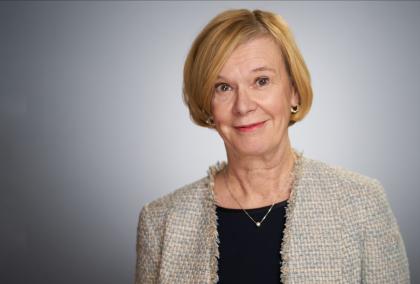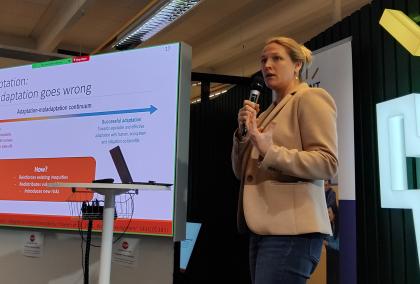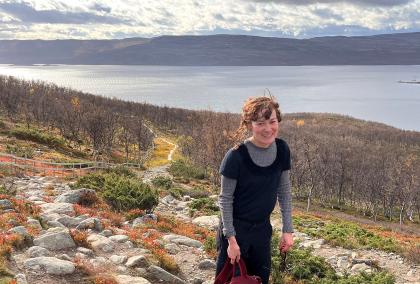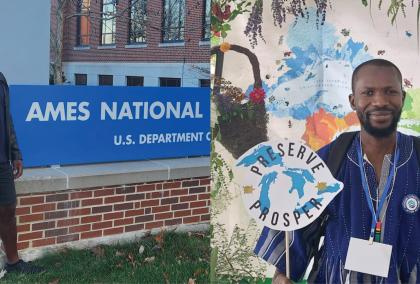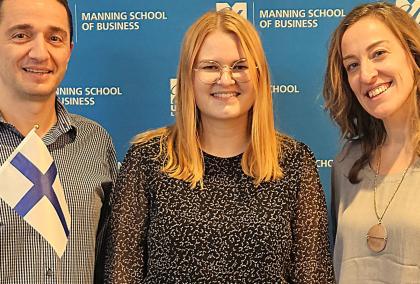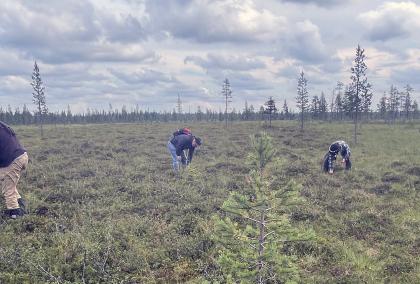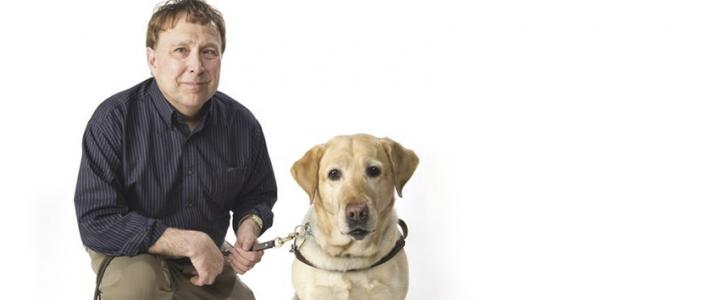

Finland has always been a vivid presence in Stephen Kuusisto’s life and creative work. Growing up in a Finnish-American family, some of his earliest memories are of the year he spent in Helsinki as a young child. “My father was an American Finn, who grew up speaking Finnish first, in a very small Finnish-only town in Massachusetts. He was one of the first Fulbrighters in Finland, arriving with the first ever cohort of U.S. scholars in 1953.”
A specialist in international relations, Stephen’s father was studying for a doctorate on U.S.-Soviet relations at Harvard University, and applied for a Fulbright for his research on Finnish approaches to the Cold War. He returned to Finland in 1958-59, bringing his young family along for the adventure.
“I was a little kid of three to four years old, and I had a magical year in Helsinki; it was like a fairy tale. Of course that's an age when many things are happening in the burgeoning mind and imagination. Helsinki has always been a place of special significance to me.”
“My father was a university professor, and later became a university president, so I grew up in a very academic environment, with lots of books, lots of ideas,” Stephen recalls. “As I was finishing my undergraduate studies, I said to him, ‘I've managed to be admitted to law school and also to the University of Iowa Writers’ Workshop. Which should I do? Should I be a lawyer or a poet?’ My father said, ‘Be a poet. There are way too many lawyers. If you get sick of poetry, you can always be a lawyer.’ But I never got sick of it. I discovered life could be wide and not narrow.”
“I had a remarkable time. As a research Fulbrighter, I was able to go all over the place. I had a lot of freedom, and was able to take time to work on my own writing.”
Stephen was inspired to embark on his own journey to Finland after meeting Finnish poets and scholars at the Iowa Writers’ Workshop. He arrived in Helsinki in 1980, funded by the Finnish bridge program, which brings Finnish Americans to Finland, and the following year was granted a Fulbright scholarship for a research Master’s degree at the University of Helsinki, focusing on international outlooks in postwar U.S. and Finnish poetry. He remembers this period of his life as a time of unfettered exploration and development. “I had a remarkable time. As a research Fulbrighter, I was able to go all over the place. I had a lot of freedom, and was able to take time to work on my own writing.”
“Helsinki is a compact city, and because of its general layout, it was like living on another college campus. You could go to the opera, the symphony, the theater, go hither and yon over the course of the day, and really engage with the life of the city. I got to know a well-known contemporary Finnish poet, Jarkko Laine, who I’d already met at the writers workshop at the University of Iowa. He was also one of Finland's leading editors and translators of poetry. I was able to talk about Finnish literature with him - it was like having an Oxford-style tutorial. I even translated some of his poems into English. I got to know lots of international visitors. I had dinner at the Irish embassy with the famous symphony flutist James Galway, and I met contemporary Finnish composers working on classical music. I really threw myself into it. I recognized that this was a special moment in my life.”
Finland remains an important touchstone in his writing. The author of seven books, including autobiographical essays, short stories and poetry collections, Stephen explains how his Finnish experiences continue to inspire him.
“Several of my books have references to, or whole stories about, Finland. For example, Eavesdropping is a book of nonfiction in which I travel around the world, listening to the sounds of different cities. The opening chapter is about Helsinki when I was a boy - all the magical sounds I heard. We lived just a stone's throw from the harbor, and I remember it being full of the sounds of people talking and laughing.”
Stephen’s latest collection, Old Horse, what is to be done? also tunes in to these memories. “Many of the poems have to do with Helsinki,” he explains.
Stephen has recently returned to the Finnish capital, reconnecting with the city and exploring new possibilities for exchange and dialogue. “This was my first visit to Finland since the early 2000s, and my sixth overall. I have pledged to be more connected and I’m looking into some projects I can do with the Fulbright Finland Foundation and its partners.”
Such international and intercultural connections are at the core of Stephen’s work as a disability advocate and educator. “Over the past eight years I’ve traveled around the world with the U.S. State Department doing what they call cultural diplomacy. I've traveled with poets, dancers and composers to different countries - China, Uzbekistan, Kazakhstan, Turkmenistan. The aim is to engage with young disabled people, to introduce them to disability as a way of knowing, a way of thinking, an inclusive matter of human experience.”
“In many places disabled people are considered outliers in culture, but that's changing. December 3rd, is the International Day for Disabled Persons as declared by the UN. In 2006 the UN adopted the international convention on the rights of persons with disabilities, modeled on the Americans with Disabilities Act, and well over 100 countries have signed it. Globally, countries are recognizing that disabled people belong in society and have rights and opportunities. It’s important to communicate the idea that disability is not a defect or disadvantage, but a fully dynamic part of the human experience, a matter of imagination.”
Stephen explains how advocating for the rights of people with disabilities forms a key part of the movement for environmental and human rights around the world. “If we’re going to build a sustainable and healthy world, it's important to understand that disability is dynamically connected to efforts to create greater understanding and better opportunities for peace. Countries that are either at war or engaged in violent colonial activity create lots of disabled people. They call it ‘collateral damage’, but if you go to the Human Rights Watch website and visit their disability pages, you discover that it is the express plan to create disabled people in many instances. The military will use rubber bullets to blind people who are protesting. Governments disable people as a method of oppression. And when war crimes are committed, often large numbers of civilians and children wind up being disabled.”
“The process of imagining a better, more livable planet, requires really profound intersectional thinking at this point in human history. We know that a peaceful planet is also a cleaner planet - the largest polluter in the world is the global military. We need a world where human beings are not being tortured, injured or disabled by policy. It's also true that a sustainable planet is one where everybody gets to use their town or city, where there is a sustainable and inclusive urban architecture that works no matter who you are.”
As University Professor at Syracuse University, New York, ‘intersectional thinker’ is an apt job description. “It’s a unique role, as it allows me to teach in any area I wish. There are only eight of us on the faculty - we’re considered people with far-roving minds!”
Stephen has also recently been appointed Director of Interdisciplinary Research at Syracuse’s Burton Blatt Institute, dedicated to the advancement of disability rights. “Right now I’m involved in a global research project involving six cities in Africa, Europe, and North America, looking at how we can make them better for people with disabilities.”
This new role allows Stephen to explore complex interdisciplinary questions in which disabled people have an important stake, including climate change, genetic engineering, and artificial intelligence technologies. The division between the different fields, Stephen argues, is a cultural divide that urgently needs to be bridged. “It’s a product of the history of universities and history of industries. You think of Henry Ford and his assembly line, everybody with his little job to do. But right now we need more people engaging across disciplines if we’re going to solve the problems that face us. During my Fulbright year in the early 80s, I remember attending an interdisciplinary workshop where urban planners and engineers were talking about the future of Helsinki. One might ask, what’s a poet doing talking to engineers? But that kind of dialogue is important.”
This approach continues to inspire Stephen, who is planning an interdisciplinary peace studies course, bringing together students from the U.S. and Finland. “The emphasis is on how peace studies can positively impact the lives of historically marginalized people. If we’re talking about planting trees, cleaning up rivers, and educating girls in developing countries, all of those things are tied to peace. It’s called a “peace dividend”. It creates a dynamic and imaginative space where we can tackle problems. We can repair historical wrongs. In the U.S. we talk about reparations for slavery. I consider that to be a peace dividend. Martin Luther King spoke about peace as a path to inclusion, prosperity, and dignity for everybody.”
“I would argue that right now, in an era when propaganda is being spread by the internet, that it's actually even more important to have open and free exchanges with scholars and artists."
For Stephen, intercultural exchanges are fundamental to peace and shared understanding. “The Fulbright program was, as far as I know, the first effort by the U.S. to create what we now call cultural diplomacy, so Senator J. William Fulbright, understood that allowing scholars to travel the world and know other scholars was essentially the most important and fundamental aspect of freedom. That of course came out of the early cold war, but it represented a visionary understanding that when people can exchange ideas and research, then freedom flourishes.”
“I would argue that right now, in an era when propaganda is being spread by the internet, that it's actually even more important to have open and free exchanges with scholars and artists. Because the internet is not a real place. A real place is when you are together in a room and you’re talking about the value of ideas and what ideas can do.”
“If you go out and volunteer, travel, engage, you’re not sitting on your chair tweeting. I believe a lot of social media reflects a fundamental lack of curiosity about other cultures and peoples. It's designed to echo what you already believe; it disincentivizes you from understanding the world. So we need cultural diplomacy more than ever. The important thing is that it's not scripted. When you meet people face to face, you discover they too want better lives, they too want the dignity of imagination and hope.”
Read the whole Fulbright Finland News magazine 1/2020!
